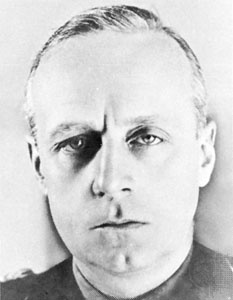Ribbentrop, Joachim von
German diplomat
born April 30, 1893, Wesel, Ger.
died Oct. 16, 1946, Nürnberg
 German diplomat, foreign minister under the Nazi regime (1933–45), and chief negotiator of the treaties with which Germany entered World War II.
German diplomat, foreign minister under the Nazi regime (1933–45), and chief negotiator of the treaties with which Germany entered World War II.Ribbentrop was the son of an army officer in a middle-class family. After attending schools in Germany, Switzerland, France, and England, he went to Canada (1910), but he returned to Germany at the outbreak of World War I, in which he served as a hussar on the Eastern Front. He was then assigned to the German military mission in Turkey. Upon his return to Germany at the end of the war, Ribbentrop worked as a Sekt (sparkling wine) salesman until his marriage in 1920 to the daughter of a wealthy Sekt producer made him financially independent. Thereafter he persuaded a distant ennobled relative to adopt him so that he could affix “von” to his name.
Ribbentrop met Adolf Hitler (Hitler, Adolf) in 1932 and joined the National Socialist Party the same year, becoming the führer's chief adviser on foreign affairs after the Nazi accession to power (Jan. 30, 1933). After his appointment in 1934 as Reich commissioner for disarmament at Geneva, he negotiated in June 1935 the Anglo-German Naval Agreement, which authorized German naval rearmament. In 1936 Ribbentrop became ambassador to Great Britain; by 1938, when he left his post, he had become a thorough Anglophobe. His advice to Hitler, that Britain could not aid Poland effectively, proved correct in the short run.
In the meantime, Ribbentrop had also negotiated the Anti-Comintern Pact with Japan (1936) and, after his appointment as minister of foreign affairs in February 1938, he signed the “Pact of Steel” with Italy (May 22, 1939), linking Europe's two fascist dictatorships in an alliance in case of war. Ribbentrop's greatest diplomatic coup, however, was the German-Soviet Nonaggression Pact of Aug. 23, 1939, which cleared the way for Hitler's attack on Poland on Sept. 1, 1939, thus beginning World War II.
With the outbreak of the war, Ribbentrop's importance rapidly declined. He signed the Tripartite Pact with Japan and Italy (Sept. 27, 1940), which provided for mutual assistance against the United States, but thereafter diplomacy became a secondary concern. Ribbentrop maintained himself only through Hitler's backing. Even this support faded after some Foreign Office personnel were implicated in the plot of July 20, 1944, to assassinate Hitler.
Ribbentrop was captured in Hamburg on June 14, 1945, tried before the International Military Tribunal at Nürnberg (Nürnberg trials), found guilty on four major counts, and hanged. While in prison he wrote Zwischen London und Moskau (1953; “Between London and Moscow”; Eng. trans. The Ribbentrop Memoirs).
- Louis Brandeis
- Louis Bromfield
- Louis Buchalter
- Louis Béjart
- Louis Cappel
- Louis-Charles-Antoine Desaix de Veygoux
- Louis-Charles Bréguet
- Louis-Charles-Philippe-Raphaël d'Orléans, Duke de Nemours
- Louis-Charles-Philippe-Raphaël d'Orléans Nemours, Duke de
- Louis Chevrolet
- Louis-Christophe-François Hachette
- Louis-Claude Daquin
- Louis-Claude de Saint-Martin
- Louis-Claude de Saulces de Freycinet
- Louis Comfort Tiffany
- Louis Couperin
- Louis Couturat
- Louis d'Armagnac, duc de Nemours
- Louis d'Armagnac Nemours, duc de
- Louis Darquier de Pellepoix
- Louis de Bourbon, Count de Soissons
- Louis de Bourbon Soissons, Count de
- Louis de Buade, comte de Palluau et de Frontenac
- Louis de Buade Frontenac, comte de Palluau et de
- Louis De France